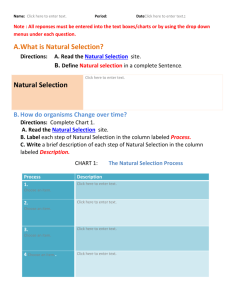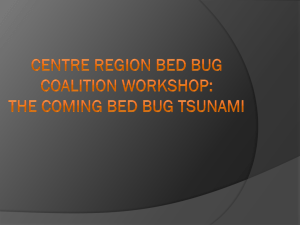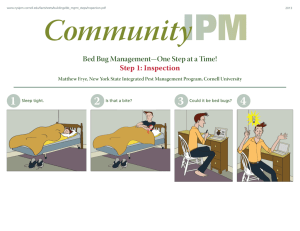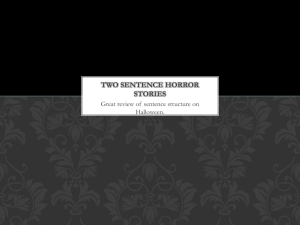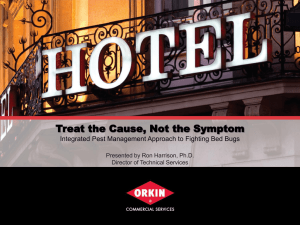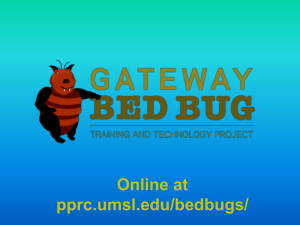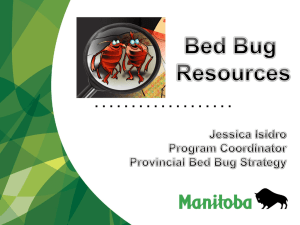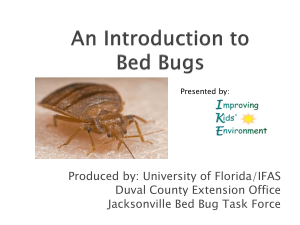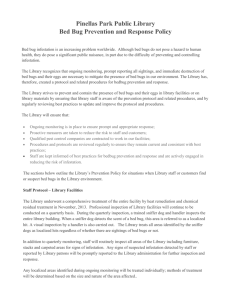Share on facebook - Penn State Extension
advertisement
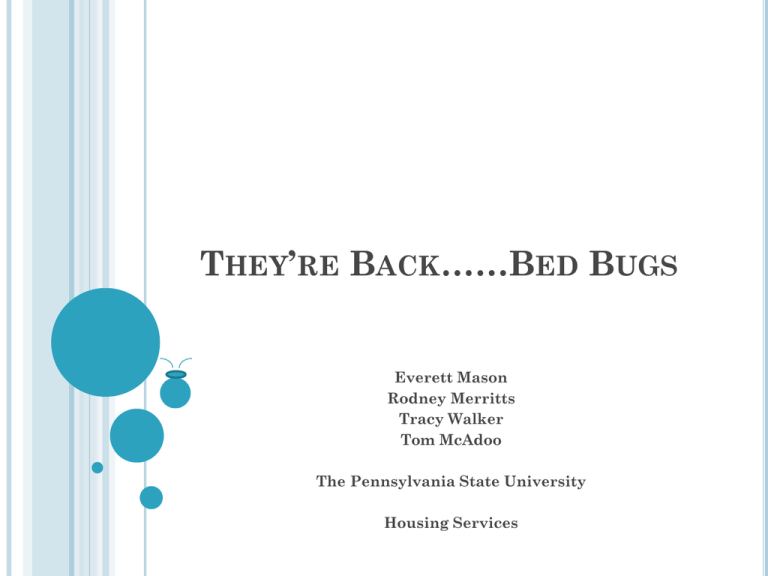
THEY’RE BACK……BED BUGS Everett Mason Rodney Merritts Tracy Walker Tom McAdoo The Pennsylvania State University Housing Services IN THIS SESSION YOU WILL LEARN… A Brief History of the Bed Bug The Nature of the Bed Bug How to Identify a Bed Bug How to Treat Bed Bug Infestations How to Educate People about Bed Bugs BED BUG HISTORY o Has always been an issue o Virtually eliminated in US o Rising numbers since 2001 o Skyrocketed in last 5 years o EPA held 1st ever Bed Bug Summit THEY’RE BACK… BUT WHY? o Increased international travel o Change in general pest control methods o Reduced available products for control o Lack of research and development TRAVEL WHO’S BEEN SLEEPING IN MY BED? BON VOYAGE ENJOY OUR FEATURED PRESENTATION EVEN MY BEST FRIEND? BED BUG BASICS o Feed only on blood o Feeding lasts 3 – 12 minutes o Nocturnal o Can detect and avoid chemicals o Cryptic o Crawl up to 20 feet to feed JUST A LITTLE GUY I’ll molt 5 times before I become an adult! LIFE CYCLE I may live up to a year without feeding I lay between 1 and 5 eggs every day! I’ll live about 10 months and lay between 300 and 500 eggs! Starting as an egg, it takes me 30 days to become an adult! One Bed Bug One Month 61 Bed Bugs COMPOUNDING INTEREST o 2 Months – 3,721 o 3 Months – 226,981 o 4 Months – 13,845,841 o 5 Months – 844,596,301 ALL DONE! IDENTIFICATION o o o o Not as small as you might think 1.5 mm – 1 cm long, flat, oval, with no wings Brown to Dark Red (Adult) Tan (Newly Hatched) TEMPERATURE EFFECTS o Below ~55˚ F Development stops o Above ~99˚ F Development stops o Thrive at temps between ~68˚ F - 80˚ F o Die at Temps > 111˚F or < 32 ˚F HOW DO YOU KNOW IF YOU HAVE BED BUGS? Check your linens Look for movement Look at the insect Color? Size? Does it have wings? Is it flat and oval? Inspect at night Seams of mattress Many bites !!!! PENN STATE’S RESPONSE STRATEGY Isolate students and their belongings in the room Pest Control responds immediately to inspect and treat Clothing and bedding treated in dryer Mattresses are removed, to be replaced after treatment Students are relocated if possible VACUUM THE CARPET Thoroughly vacuum the carpet areas Can occur before or after the heat treatment Dispose of the vacuum bag STEAM TREATMENT Pull the carpet back from baseboards Steam along all edges at the junction of carpet and wall RESIDUAL APPLICATION Apply residual insecticide along junction of wall and floor Apply dust behind all wall plates OTHER TREATMENTS Heat Chamber Bed Bug Dogs PANELS GOING TOGETHER TOP GOING ON HEAT CHAMBER SO, WHAT’S THE PROBLEM? BE PREPARED Who will respond? When will the call come? Who When Where Where will your resident stay? How will you treat the room? How What What are you going to say?? YOU CAN RUN, BUT YOU CAN’T HIDE Be proactive Educate Be a partner BED BUG WEB SITES Mike Potter University of Kentucky http://www.uky.edu/Ag/Entomology/entfacts/struct/ef636.htm Australian Medical Entomology – http://medent.usyd.edu.au/fact/bedbugs.html University of Minnesota – http://www.ipmctoc.umn.edu/ Harvard School of Public Health – http://www.hsph.harvard.edu/bedbugs/#manage Mayo Clinic – http://www.mayoclinic.com/health/bedbugs/DS00663 List of Bedbugs Resources – http://www.utoronto.ca/forest/termite/Bedbugs/bbres.html National Pest Management Associationhttp://www.pestworld.org/consumer/default.asp QUESTIONS?
